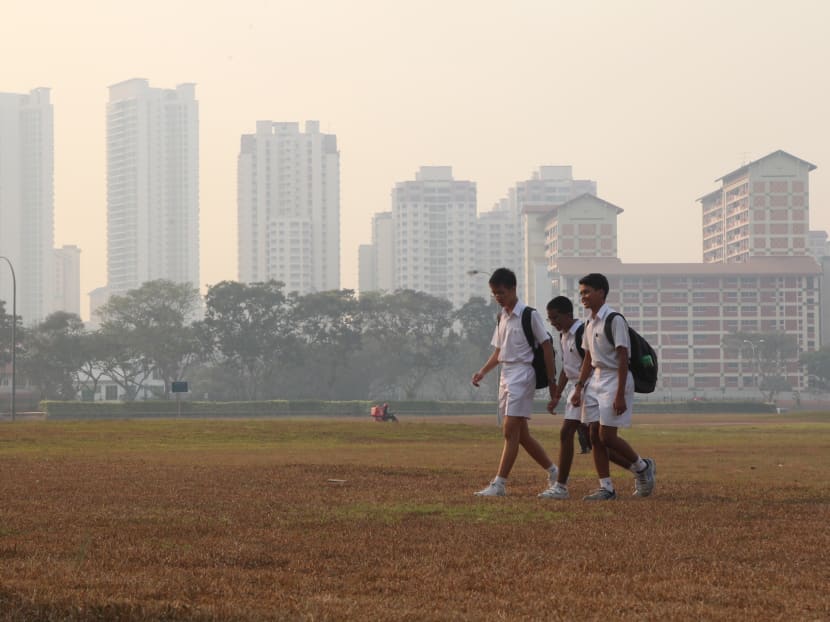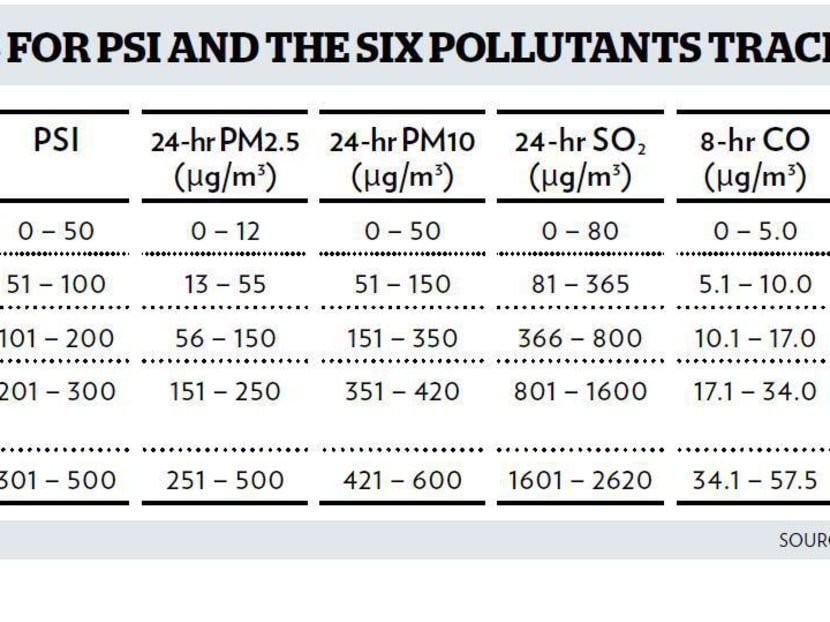PSI to include fine particulate matter
SINGAPORE — The Republic could experience many more days of “moderate” air quality from May, despite the air being no more polluted than the past. This is because levels of fine particulate matter, or PM2.5, will be incorporated into the Pollutant Standards Index (PSI).
SINGAPORE — The Republic could experience many more days of “moderate” air quality from May, despite the air being no more polluted than the past. This is because levels of fine particulate matter, or PM2.5, will be incorporated into the Pollutant Standards Index (PSI).
The change will mean more integrated air quality reporting, said Minister for the Environment and Water Resources Vivian Balakrishnan yesterday, as he announced several measures — targeting vehicular emissions, fuel quality and transboundary haze — to improve air quality here.
PM2.5, or the concentration of particles smaller than 2.5 microns, is currently reported separately from the PSI. The PSI includes levels of PM10 (coarser particulate matter), sulphur dioxide, carbon monoxide, ozone and nitrogen dioxide. When PM2.5 becomes the additional parameter, it is likely to be the key pollutant setting the index — which reflects whichever pollutant is most significant — almost all the time, said Dr Balakrishnan.
PM2.5 levels of 18 to 42 micrograms per cubic metre at 8pm last night would be considered moderate under the enhanced PSI. According to the National Environment Agency, the Republic’s PM2.5 levels over the past five years would have put the PSI here in the “moderate” range more than 90 per cent of the time, in contrast to more than 90 per cent of days in the “good” range under the current index.
The move towards integrated air quality reporting was welcomed by respiratory and climate change experts. PM2.5 comprises mainly water, sulphates, acids, nitrates, organic carbon and trace metals, and can penetrate deep into the lungs. Short-term exposure can cause respiratory tract symptoms such as cough, wheezing and shortness of breath, while long-term exposure can cause a gradual decline of lung function, said Dr Jason Phua, head of the National University Hospital’s Respiratory and Critical Care Medicine Division.
There is increasing research that correlates PM2.5 with overall mortality, since small particles do not get filtered out by upper airways and, as a result, penetrate into the deep recesses of the lungs, triggering heart attacks, said Associate Professor Philip Eng of Mount Elizabeth Hospital.
Air pollutants and climate change expert Jason Blake Cohen, of the National University of Singapore, said PM2.5 is an important air pollutant and should be factored into the PSI, which is a good tool to inform the public about air quality hazards as it uses a single number and is easy to understand.
The main sources of PM2.5 in Singapore are industrial activities, emissions from older vehicles, ships and, when they occur, forest or plantation fires. PM2.5 is a standard measurement preferred by scientists and researchers because equations used for air quality indices may vary across countries and there is “more than one way you can come up with the same number”, said Asst Prof Cohen.
Giving an update on Singapore’s efforts to tackle transboundary haze — which caused the three-hour PSI to creep up to 84 at 8pm last night — Dr Balakrishnan said no concession maps for the Haze Monitoring System or information on errant companies have been forthcoming. But the Republic hopes to sign a memorandum of understanding to renew collaboration with Jambi province in Sumatra later this year.
In addition to proposed laws targeting local and foreign companies that cause the haze here, Singapore will appoint an international advisory panel on transboundary pollution. Co-chaired by former Deputy Prime Minister S Jayakumar and top diplomat Tommy Koh, it will advise the Government on trends and developments in international law relating to transboundary pollution and solutions and steps Singapore can take. The panel will make recommendations to the Government later this year.








